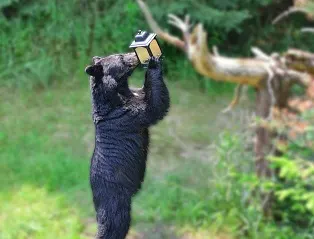
These bear-safety tips could save you hundreds of dollars
Ready or not, fall is right around the corner and, after a summer already filled with close encounters of the ursine kind, officials are warning B.C. residents to be prepared for an uptick in bear activity.
Bears getting ready to hibernate will be on the lookout for easy access to food and that can include paying a visit to your property.
The B.C. Ministry of Environment and Climate Change told The Weather Network's Mia Gordon conservation officials will be stepping up random checks in areas with bear activity to make sure homes are being 'bear smart.' It's not just important for safety, either. Most municipalities in B.C. have bylaws designed to restrict wildlife attractants; failure to comply with a dangerous wildlife protection order can land you a fine of up to $575.
SEE ALSO: Bear chases a selfie-seeking tourist
KEEPING YOUR HOME BEAR SAFE
Minimize garbage smells: A black bear's sense of smell is much stronger than a dog's, so it's important to take steps to minimize how tasty your property smells to a four-legged diner.
Bear safety experts recommend keeping your garbage and compostables securely stored until collection day -- freezing or refrigerating things that are especially smelly can help. About 60 per cent of calls to the Conservation Officer Service reporting line are about garbage concerns.
Maintain fruit trees and berry bushes: Your home garden could become a buffet for a hungry bear, especially if you leave fragrant fruits and windfalls to rot. Make sure to pick fruits and berries before they become overripe, and clean the ground around trees and bushes.
Don't let your bird feeder be a bear-feeder: Some communities ban bird feeders during bear season, but if yours doesn't, there may still be bylaws in place about how high and how far from the house, fence, or other climbable structures they should be hung.
Keep your barbecue clean: Even if you keep your steak medium-rare, you should burn your grill clean when you're finished using it; burning for an extra five minutes after you remove your food should do the trick. It's also important to remove the grease and, if possible, store your grill inside (or at least out of the wind).
According to Wild Safe BC, bear activity accounts for approximately 20,000 calls to the Conservation Officer Service reporting line each year.
Once a bear gets used to an easy-to-reach buffet, it can be hard to convince them to go back to looking for food the old-fashioned way. "Relocation seldom works with bears," says Wild Safe BC. "Translocated wildlife often fail to adapt to their new habitat and, as a result, may starve to death or be killed by those animals that already occupy the area." If bears come to rely on non-natural food sources, sometimes they won't even hibernate.
Bears who are habituated to human food (and human contact) often have to be destroyed due to safety concerns.
Sources: Wild Safe BC |










